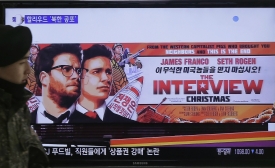the interview
Amongst the many ambiguities and unknowns surrounding “the great Sony hack” of 2014, one thing is clear: a non-state actor was publicly shamed—quite effectively—by a powerful state.

Alexander Lee White on how Obama should have responded to fallout from the Sony hack.
This holiday season has stood out a bit from others, being the first time, at least as far as I can recall, that cyber warfare and the fictional assassination of North Korea's Supreme Leader have featured so very prominently in news and personal discussions. The Sony Pictures release of The Interview [...] has actually generated some interesting ideas about cybersecurity, information warfare, and a host of other issues.
Most North Koreans (except those who defected) with whom this correspondent had conversed in Pyongyang and elsewhere appeared to sincerely believe what they read in their country’s media: The United States and its allies are looking for any opportunity to undermine their country’s socialistic system and thwart its attempts to advance, militarily and materialistically.
To those pulling out their tin foil hats and claiming that Sony managed to pull one over on the planet by manufacturing this whole scandal – just remember that the thing about soft power is that you can’t always control how it goes down.
The unfolding episode over the film The Interview underlines the potential for business decisions, whatever their motivation, to become intertwined with foreign relations among states and companies.
President Barack Obama declared Friday that Sony “made a mistake” in shelving a satirical film about a plot to assassinate North Korea’s leader, and he pledged the U.S. would respond “in a place and manner and time that we choose” to the hacking attack on Sony that led to the withdrawal. The FBI blamed the hack on the North’s communist government.
This week Western newspapers had a field day with North Korea’s response to the release of a trailer for the upcoming movie “The Interview” starring Seth Rogan and James Franco. The BBC, NPR and Washington Post all carried headlines announcing that North Korea had threatened war over the movie. Not to be outdone, the New York Post ran a headline proclaiming North Korea “threatens ‘merciless’ war” over the movie, while the Huffington Post announced “North Korea Threatens… ‘All Out War.’”







